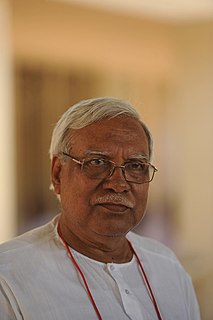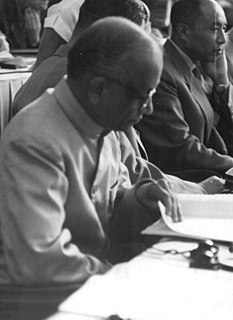Related Research Articles

The Communist Party of India (Marxist) is a communist political party in India. It is the largest communist party of India in terms of membership and electoral seats and one of the national parties of India. The party emerged from a split in the Communist Party of India (CPI) on 7 November 1964. As of 2022, CPI(M) is a part of ruling alliances in two states — the Left Democratic Front in Kerala and the Secular Progressive Alliance in Tamil Nadu. CPIM has representation in the legislative assemblies of 9 states.

The Communist Party of India (CPI) is the oldest communist party in India and one of the eight national parties in the country. The CPI was founded in Kanpur on 26 December 1925.

Communist Party of India (Marxist–Leninist) is a communist party in India. The party is one of many working under the name of CPI (ML). The party general secretary was Kanu Sanyal. The name of the party is identical to the original Communist Party of India (Marxist–Leninist) formed in 1969, of which Sanyal was also a key leader, but Sanyal has stated that his party is not the same as this party.

Harkishan Singh Surjeet was an Indian Communist politician from Punjab, who served as the General Secretary of the Communist Party of India (Marxist) from 1992 to 2005 and was a member of the party's Political Bureau from 1964 to 2008.

Hannan Mollah is an Indian communist politician and a senior leader of the All India Kisan Sabha. He was the member of Indian parliament and elected as the Lok Sabha for eight times from constituency of Uluberia in Howrah district of West Bengal, mollah is the member of Politburo of the Communist Party of India (Marxist).
Gangadhar Appa Burande was an Indian politician.

Hare Krishna Konar was an Indian marxist revolutionary, radical activist and communist politician. Konar was a founding member of Communist Party of India (Marxist), and the leader to start the first Land reforms and Agrarian reforms in India as well as the chief architect of the West Bengal land and property distribution. In 1930s for making arms and bombs for the Jugantar group, he was deported to the Cellular Jail for 6 years at the age of 18 and their he took part in the first Hunger strike and in 1935 he founded the Communist Consolidation and led the historical second hunger strike. Konar was the mentor of freedom fighters like Batukeshwar Dutt, Shiv Verma, Sachindra Nath Sanyal, Ganesh Ghosh, etc.

Samar Mukherjee was an Indian Communist leader. who served as member of the Lok Sabha, the lower house of the Parliament of India for the Howrah constituency for three consecutive term, and as a member of the Rajya Sabha. He was a member of the Polit Bureau, member of the Central Committee of Communist Party of India (Marxist) and he was also the General Secretary CITU.
Jagjit Singh Lyallpuri was an Indian politician. He was the oldest surviving member of the founding Central Committee of the Communist Party of India (Marxist).

Z.A. Ahmed was an Indian politician from Uttar Pradesh, belonging to the Communist Party of India. In the 1930s, acting on instructions from the CPI, he joined the Congress Socialist Party in which he served as All India Joint Secretary. After a brief period in exile in Pakistan in the 1940s, Ahmed returned to India and became Secretary of the Uttar Pradesh Committee of the CPI. He subsequently served in the Rajya Sabha for four terms, his last term ending in 1994.
Balkrishna Sharma was an Indian politician. He was a leader of the Communist Party of India and the Kisan Sabha. Sharma was active in organising peasants movement in northern Madhya Pradesh for various decades. Together with other CPI leaders such as Khan Shakir Ali Khan he organised occupations of estates of ex-princes and other large landowners. As of 1973 he was a member of the Central Kisan Committee, the national leadership of the All India Kisan Sabha.
Uddaraju Ramam was an Indian politician. He was a parliamentarian and a leader of peasants movement. He has three sons and two daughters.
Mohammed Abdullah Rasul, Born: 1903, Died: 21 November 1991, was an Indian politician. He belonged to the Communist Party of India (Marxist). M.A. Rasul was a prominent leader of the peasants' movement and served as minister in the West Bengal state government for a short period in the 1960s.
Krishnapada Ghosh (1914–1987) was an Indian politician and trade unionist. He served as West Bengal Minister of Labour 1969–1970 and 1977–1985. He was a Central Committee member of the Communist Party of India (Marxist). He was also a member of the Working Committee of the Centre for Indian Trade Unions.
Homi F. Daji was a member of the 3rd Lok Sabha of India. He represented the Indore constituency of Madhya Pradesh and was a member of the Communist Party of India.

In 1964 a major split occurred in the Communist Party of India. The split was the culmination of decades of tensions and factional infighting. When India became independent in 1947, differences arose of how to adapt to the new situation. As relations between the Nehru government and the Soviet Union improved, a faction that sought cooperation with the dominant Indian National Congress emerged within CPI. This tendency was led by S.A. Dange, whose role in the party hierarchy became increasingly controversial. When the Sino-Indian War broke out in 1962 Dange's opponents within CPI were jailed, but when they were released they sought to challenge his leadership. In 1964 the party was finally divided into two, with the left faction forming the Communist Party of India (Marxist). The split had a lot of regional variations. It also impacted other organizations, such as trade union and peasant movements. The split has been studied extensively by scholars, who have sought to analyze the various domestic and international factors involved.
Kameshwar Pandit was an Indian politician, trade unionist and journalist. Pandit founded the Himachal Pradesh branch of the Communist Party of India in 1953.
Y. V. Krishna Rao, popularly known as YVK, was an Indian politician and leader of Communist Party of India who served as General Secretary and President of the All India Kisan Sabha.
References
- 1 2 Sir Stanley Reed (1962). The Times of India Directory and Year Book Including Who's who. Bennett, Coleman. p. 1193.
- 1 2 New Challenges of Politics in Indian States. Uppal Publishing House. 1986. p. 237. ISBN 978-81-85024-02-8.
- ↑ Onkar Chand Sud (1992). Administrative Problems of Rural Development in India. Kanishka Publishing House. p. 17. ISBN 978-81-85475-15-8.
- ↑ Socialist India. Indian National Congress. All India Congress Committee. 1971. p. 94.
- ↑ Link. United India Periodicals. 1977. p. 25.
- ↑ UNI. Founding member of HP CPI(M) Mohar Singh passes away
- 1 2 All India Kisan Sabha. Conference (1999). Documents of the 29th Conference of All India Kisan Sabha, Kozhikode, Kerala, March 5-8, 1999. All India Kisan Sabha. p. 9.